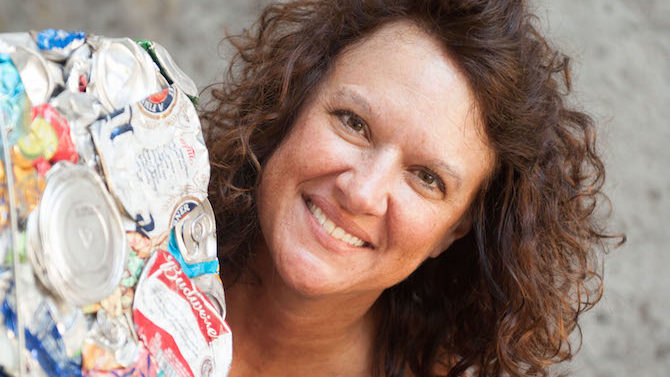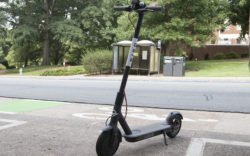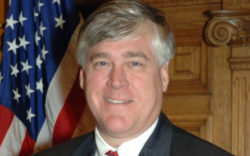Bracing themselves for pushback from the public, ACC commissioners last week began to consider how (or whether) to revise the county’s system of residential trash pickup to deal with frequent complaints of too many trash trucks rumbling through neighborhoods. But this is the fourth time in 20 years that commissioners have considered the same problem, Solid Waste Director Suki Janssen told commissioners, and so far, the county has only limited the number of hauling companies to five.
Commissioners could go further by setting up separate zones for each hauler to serve (so only one trash truck would go down streets each week), or by eliminating private haulers altogether and serving the entire county with the county’s own trucks (which already serve about half of county residents—those living within the former city limits). In either case, the county would set rates, which might go up a bit to cover recycling costs, and “self-haulers” who do not now pay for trash pickup could be required to do so, because commissioners suspect some may be burning trash or dumping illegally rather than going to the landfill. For the county to serve all residents, initial purchases of additional trucks and equipment would cost some $6 million.
“You have lots of people that are going to have to change trash haulers that they’ve been using for 20 or 30 years,” Commissioner Andy Herod said, arguing against any change beyond giving the county an ability to hold haulers accountable when they violate their contracts. (Haulers sometimes drop trash along streets, or fail to run routes every week.) “I don’t want to put the haulers out of business,” said Commissioner Jerry NeSmith. But others saw it differently: If ACC is going to manage billing, customer service and setting rates for the entire county, Commissioner Mike Hamby wanted to know, why shouldn’t it pick up the trash too? Denson agreed that expanding the county’s own trash service is the “best solution.”
Previous discussions about setting zones for trash service “brought out passionate people and their trash haulers,” Janssen warned commissioners. “If you want a lot of people coming out to City Hall, this is going to bring them out,” Herod agreed.
A public input meeting on waste collection is scheduled for 5:30 p.m. Aug. 27 at the Unitarian Universalist Fellowship, and a survey is online at accgov.com/collectionsurvey. The subject will then be taken up again at a fall work session.
Providing receptacles for the public to dump trash “could be discussed, as litter and illegal dumping are on the rise,” Janssen told Flagpole, but “they are often a hot mess unless staffed.”
She said franchise zones for haulers—which is done in other places, including Gwinnett County—usually increase recycling rates. “Recycling’s hurting,” she added, as markets have shrunk, and the county no longer makes money on it. Glass is hard to sell, and so are plastics other than Nos. 1 and 2, and ACC might stop accepting either.
“Recycling should never have been touted as a money-maker,” Janssen said, but commissioners have strongly supported it for environmental reasons and to extend the life of the county’s Lexington Road landfill. Over 100 Athens jobs are directly tied to recycling, and one-third of the nation’s recycled No. 1 plastic bottles are turned into carpet in Georgia.
Private haulers now charge extra to pick up recycling, but drop-off areas are available throughout the county.
Long List for Local Legislators
State decisions, sometimes made for ideological reasons, have local effects that local governments must deal with. Twice a year, ACC commissioners meet with Athens’ five state legislators—Reps. Spencer Frye, Marcus Wiedower and Houston Gaines, and Sens. Bill Cowsert and Frank Ginn—often with a list of complaints and requests for legislation. Legislators tend to praise “local control” but override local preferences when they legislate.
A perennial frustration to locals is their inability to set and enforce local speed limits. Even on local streets, speed limits must be state-approved (and, ironically, must be set at the speed that most traffic is already going). That’s one of a laundry list of changes that commissions may request of the legislators at September’s work session—it’s the longest wish list yet.
Others suggested by Mayor Kelly Girtz and various commissioners include: moving non-partisan local elections from May back to November; paying school board members at least $15,000; letting local governments set penalties for an ounce or less of marijuana; allowing local governments to designate opportunity zones, which allow tax credits for jobs created; providing state money for local transit; requiring UGA to give dollar-equal (rather than percentage) raises to employees to better benefit low-wage earners; re-establishing an income cap on HOPE scholarships, which have “basically become an entitlement program for wealthier kids,” said Commissioner Melissa Link; better supporing vulnerable Georgians, including children and mothers, with abortion having become “pretty much impossible,” Link said; training and background checks for gun purchases; ability to regulate (and require regular pumping of) local septic tanks; limiting tax increases on low-income homeowners; expanding Medicaid; enabling local participation in “community choice aggregation” electric-power programs, which allow local communities to negotiate for lower power rates and sustainable sources; limiting hours of gaming machines at convenience stores, which have “implications for quality of life,” said NeSmith; allowing single-county sales taxes that support rural transit; better oversight of emergency ambulance services; and support for rural broadband.
Commissioners will further discuss and refine the list before they meet with legislators.
Like what you just read? Support Flagpole by making a donation today. Every dollar you give helps fund our ongoing mission to provide Athens with quality, independent journalism.










